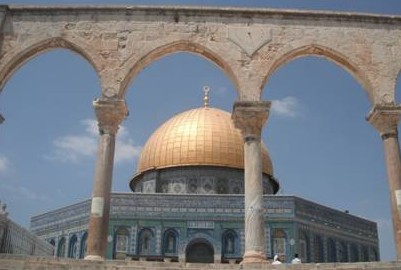6th November 2013
Jerusalem: Handle with Care
At an exhibition in Jerusalem recently I saw a display of amusing but thought-provoking objects. One was a simple box of safety matches, the kind that you can flip open. The only difference was that the heads of the matches were shaped like the domes, spires and minarets of Jerusalem. The message was clear: this city is flammable.
If it is not handled with care, if the rights and sensitivities of the three great religious faiths who rightly regard the city as home are not respected, it is like playing with fire.

A recent book about the city opens with the line: “The history of Jerusalem is the history of the world”. That history is littered with massacres, mayhem and murder. Nebuchadnezzar razed the city in the 6th century BC; the Romans destroyed it in 70 AD; and the Crusaders plundered it in the 11th century. The savagery of these events was truly horrifying: terrible sieges followed by slaughter when the victors dismembered, crucified and raped the terrified inhabitants.
Why here? What is it about this small provincial town in the Judean hills that gives rise to such violence, fanaticism and bigotry? Unlike most successful cities, it has no river, no sea and no resources. Yet it has become so important to many different cultures, so iconic that any endeavour to create a noble civilisation is called ‘a new Jerusalem’.
The answer is religion. For Jews, Christians and Muslims, this is The Holy City. Worshippers flock to the holiest sites: the Western Wall, the Church of the Holy Sepulchre and the Al-Aqsa mosque. In the past, the followers of various religions sought exclusive possession of the city. The believers of one faith would erase the visible signs of the other religions, slaughtering the innocent, banishing the defeated and demolishing their holy places.

Modern times have brought new attitudes towards violence, arguing in favour of co-existence, freedom of worship and the rule of law. So today the three religions exist side-by-side. The faithful travel from afar to pray at the shrines, churches, synagogues and mosques which fill the Old City.
Many different cultures interlink and overlap in Jerusalem. This delicate status quo needs to be protected and preserved. Unlike the past, when news took months to reach other countries, what happens in Jerusalem today reverberates around the world. Actions that touch on the deeply-held convictions of other faiths can fuel religious and political tensions and light the fuse of violent counter-reactions in the city and elsewhere.
Walking through the Old City with its Muslim, Christian, Jewish and Armenian Quarters is a truly wonderful experience. Visiting the holy sites, you can feel what one author called “an infectious holiness”
Yet Jerusalem was once described as ‘a golden goblet full of scorpions’. There are tensions lurking just below the surface. Like the box of matches symbolising the dangers of disrupting Jerusalem’s delicate balance, it is in everyone’s interest to handle the tensions with care.
‘… the three great religious faiths who rightly regard the city as home…’
Where is Jerusalem mentioned in the Q’ran?
Dear Peter, by reading lines like ” At an exhibition…”I was crying.
So I read your article twice. That ‘s why, I ‘m also still optimistic.
Nevertheless : I do truly believethat the human nature isn ‘t interested in building new(war)-machines but building up new friends. Chapter 2 is to me the best one. I t ‘s like a time machine.Very interesting.
Ingo-Steven, StuttengartenWuerttemberg